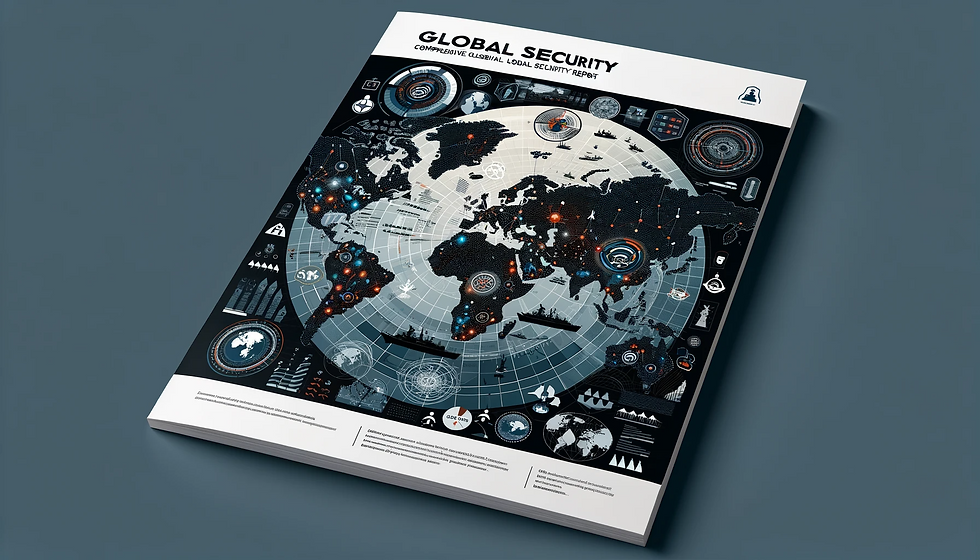Dec 6: Global Security Developments
- Ivan

- Dec 6, 2023
- 3 min read

Main Developments
Putin's Middle East Visit: Russian President Vladimir Putin's rare overseas trip to the Middle East, specifically Saudi Arabia and other countries, is a significant diplomatic move. The journey is noted for its rarity and potential risks, given Putin's international standing and the current geopolitical tensions.
DEFCON 2 Status and UK's Warning: The heightened alert status to DEFCON 2 for a 48-hour period indicates a significant increase in global military tensions. Concurrently, the UK's advisory for citizens to stock up on essentials, including torches and candles, suggests preparations for possible large-scale cyberattacks and disruptions.
Baltic Crisis and Yemen Conflict: Russia's military reorganization and preparation for potential conflicts in the Baltic region against NATO forces are noteworthy. Simultaneously, the ongoing conflict in Yemen and its implications for regional stability, especially in the Red Sea, are highlighted.
FBI's Terror Threat Warning: The FBI Director's statement about an unprecedented level of terror threats, including the risk of hybrid warfare, adds another layer of complexity to the global security scenario.
Ukraine Conflict and NATO Dynamics: The ongoing conflict in Ukraine and its impact on NATO's strategic posture, along with discussions about a potential 'flashbulb' event to galvanize American support, are critical elements of the current geopolitical landscape.
Cybersecurity Concerns: The UK's recent cybersecurity issues, including a cyberattack on a nuclear site and toxic waste disposal challenges, underscore the growing importance of cybersecurity in national defense strategies.
Middle East Dynamics: Israel and the US's rumored establishment of a special ops force in the Red Sea, and the potential for Houthis’ response in Yemen, point to escalating tensions in the Middle East.
Global War Preparations: Various countries, including Venezuela's potential involvement in a larger conflict, indicate a broadening of military preparations and alignments globally.
Economic Factors: Discussions on the impact of OPEC's oil production cuts and the fluctuations in gold prices reflect the intertwining of global economic stability with security concerns.
Implications and Insights
Geopolitical Shifts: Putin's Middle East visit could signify a strategic realignment or a diplomatic effort to mitigate tensions. The trip's timing and destinations could offer insights into Russia's global strategy amidst the ongoing conflicts.
High Alert Status: The DEFCON 2 status points to a critical juncture in global military readiness, possibly related to escalating tensions between major powers.
Regional Conflicts and Global Impact: The Baltic crisis and the Yemen conflict could have far-reaching consequences, affecting global trade routes and regional power balances.
Heightened Security Risks: The FBI's heightened terror threat warning suggests a complex security environment, possibly involving non-state actors and unconventional warfare tactics.
Ukraine and NATO: The situation in Ukraine remains a pivotal factor in NATO's strategic calculations. Any significant development here could alter the alliance's dynamics and its members' military commitments.
Cybersecurity as a Priority: The focus on cybersecurity in the UK highlights the growing importance of this domain in national security strategies, necessitating enhanced defense mechanisms.
Middle East Tensions: The potential establishment of a special ops force in the Red Sea and the dynamics in Yemen signal a possible escalation in the region, with implications for global energy markets and strategic alliances.
Conclusion
The current global security environment is marked by significant tensions and potential flashpoints across various regions. From Putin's diplomatic moves in the Middle East to heightened military readiness and cybersecurity concerns, the landscape is complex and rapidly evolving. The interplay of these factors necessitates continuous monitoring and strategic assessment to understand the full scope and potential trajectories of these developments.






Comments